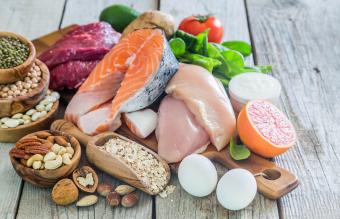
A recent review of scientific research showed high fat diets are both safe and beneficial for one's health. While individual results vary, outcomes have included improved athletic performance, weight loss, improved cholesterol, decreases in blood pressure and blood glucose levels, better hormone balance, and reduced cardiovascular risk. You can reap benefits by implementing this diet in your life.
How It Works
The purpose of a high fat diet is to induce ketosis, a state in which your body oxidizes fat over glucose to use as energy. Essentially, it increases fat burn. This is true in Atkins as well as other ketogenic diets. Ketosis is achieved faster when a few factors are in place.
- Overall carbohydrate intake is reduced. This is usually achieved by drastically decreasing or completely eliminating grains and starches and by increasing consumption of fruit and vegetables.
- Fat is taken from healthy, natural sources, such as nuts, minimally processed oils, and fish, instead of highly processed sources, such as fast food.
Those who eat a high fat diet re-balance their macronutrients to consume roughly 60 to 75 percent of calories in fat, 15 to 30 percent in protein, and 5 to 10 percent in carbohydrates.
Habits to Avoid
Problems occur when a high fat diet is implemented the wrong way.
Failing to Re-Balance Nutrients
Increasing fat intake without adjusting carbohydrates and protein will result in an excess of calories, which can lead to weight gain, the exact opposite of what most dieters are looking for. For best results, cut carbs substantially and moderately reduce protein.
Eating too Much Fat
A misconception of a high fat diet is that you need to consume large portions of fat. Fat is more calorie dense than protein and carbs, which means that although your goal nutrient ratios will change, your portions will still be relatively small. A good habit to practice is checking the amount of fat in a particular food before you eat it. Online calorie counters, such as MyFitnessPal, often include the grams of fat. Aim for a maximum of 20 to 40 grams per day, depending on your calculated needs. Likewise, make sure the fats you eat come from not natural sources. Avoid trans and hydrogenated fats.
Consuming too Much Protein
Specifically, animal protein lacks fiber and other nutrients that are necessary for proper digestion. Studies show this can lead to impaired liver function, increased cancer risk, and coronary artery disease. According to the Harvard Medical School, you only need about .36 grams per pound of body weight and less if you aren't working out. So keep your portions moderate.
Proper Planning Is Key
In the past, there was concern that a high fat diet would not be sufficient to account for a person's daily dietary needs. Researchers have recently found concerns are unfounded. A high fat, low carb diet can provide those consuming it with balanced nutrition, complete with the vitamins and micronutrients people need on a daily basis. It does, however, take a bit of extra effort.
- Plan your meals in advance. Take time during the weekend to brainstorm each meal and write them down.
- Include all three macronutrients in each meal. Each one should have protein, carbohydrates, and fat. This will keep you satiated between meals and aide in nutrient absorption, as well as energy maintenance.
- Mix it up. Different foods benefit your bodies in different ways. Instead of eating the same thing all the time, cycle through a variety of options for each macro category.
Test It Out
High fat diets have been proven to be effective in helping dieters achieve their health and fitness goals. Since individual needs differ, it's important that you test it out to see if it will work for your personal lifestyle. Instead of creating a plan on your own, try a structured plan like the Atkins Diet to see if it is right for you.







